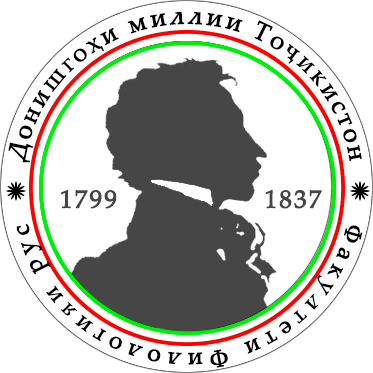The history of the faculty’s establishment
The history of the Faculty of Russian Philology is closely linked to the establishment of Tajik State University in 1948.
The first year of study was conducted in the building of the Dushanbe Pedagogical Institute named after T. G. Shevchenko (now the S. Aini Tajik State Pedagogical University). In the first two years, only 240 students were enrolled at the university. Almost the entire teaching staff of the Faculty of History and Philology was made up of Russian specialists. With a sense of deep reverence and respect, we can mention the following scientists: Vladimir Gavrilovich Astakhov, Anton Antonovich Gorbachevsky, Yuri Aleksandrovich Molchagin, Irina Alekseevna Filippovskaya, Iraida Petrovna Nechaeva, Yakov Ilyich Gordon, Asya Grigorievna Gordon, Boris Lvovich Milyavsky, and many others. One of the first deans of the faculty was Vladimir Gavrilovich Astakhov, a participant in the Great Patriotic War who dedicated himself to training young teachers of Russian language and literature. During the faculty’s existence, its deans were: Petrushkov V. S., Dodikhudoyev R. Kh., Volodina V. A., Molchagin A. A., Gorbachevsky A. A., Ushakovsky V. S., Efimov V. V., Nagzibekova M. B., and Mukhametov G. B. The Faculty of Russian Language and Literature existed at the university until 1996 and was transformed into the Department of Russian Language and Literature of the Faculty of Philology due to the opening of the Russian-Tajik (Slavic) University (RTSU). In September 2007, the Faculty of Russian Language and Literature was re-established at Tajik State National University (TSNU) on the basis of the Department of Russian Language and Literature of the Faculty of Philology, the Department of Russian Philology, and the Interfaculty Department of Russian Language. Until 2015, the faculty was headed by Professor Nagzib, a Doctor of Philology.
In 2015, the Faculty of Russian Language and Literature was renamed the Faculty of Russian Philology. From 2015 to 2023, the faculty was headed by Dr. G. B. Mukhametov, a professor of pedagogy. Since 2023, the dean of the faculty has been Dr. Kh. I. Ikromzoda, a professor of philology.
The structure of the faculty
Currently, the educational process is provided by five departments:
Department of General Linguistics and Comparative Typology:
Department of World Literature:
Department of Translation and Intercultural Communication:
Department of Methods of Teaching Russian Language and Literature:
Department of Russian Language for non-philological faculties:
The faculty has educational and methodological, lingva-phone rooms and the Russian Center.
Educational activities
The educational activities of the Faculty of Russian Philology are focused on training highly qualified specialists in such areas of professional activity as Russian language and literature, as well as the theory and practice of translation.
Since 2011, the faculty has been operating under a two-tier higher education system providing training:
– Bachelor’s degree in Russian Language and Literature at the National School (21050200);
– Russian Russian Translation: Bachelor’s degree in Theory and Practice of Translation (Russian-Tajik, Tajik-Russian) (21050404);
– Bachelor’s degree in Foreign Language (with language indication) (21050208);
– Master’s degree in the program “Russian Language and Literature in the National School” and “Theory and Practice of Translation” (21050200):
In addition, the faculty provides training for highly qualified researchers through the Doctoral Program (PhD) in the specialty 6D011800 “Russian Language and Literature”.
The faculty’s part-time program offers the following specialties:
“Russian Language and Literature in a National School” (21050200);
Research activities
Research work of students of the Faculty of Russian Philology is an integral part of the educational process and is its logical continuation. Its main areas include the preparation of essays, term papers, and final qualifying works, the implementation of bachelor’s and master’s research, participation in student conferences of various levels (intra-university, inter-university, and republican), as well as in competitions and contests in the field of study. Business games organized by faculty members to form professional competencies of students occupy an important place.
Every year, the faculty’s students participate in traditional scientific events, such as the “Russian Language Week” and the intra-faculty April Conference. The most active students prepare for international and national competitions, where they regularly win prizes. The faculty hosts a wide range of scientific and methodological events, including open lessons for teachers at schools in the Republic of Tajikistan, thematic roundtables, and exhibitions and presentations dedicated to the languages of the CIS countries, including the Tajik language.
Special attention is paid to the Winter and Summer Schools of Russian Studies, which are designed for teachers of Russian language and literature at universities and secondary schools in the republic. Over the years, more than 250 teachers and professors have participated in these programs and received the corresponding certificates. The faculty organizes international conferences and forums, which are attended by leading scientists from Russia and the CIS countries. The faculty’s professors engage in active research activities, publishing monographs, textbooks, teaching materials, and scientific articles that contribute to improving the quality of the educational process and the research work of students.
International activities
The Faculty of Russian Philology has close scientific and professional ties with leading educational and scientific centers. Among them are all higher educational institutions of the Republic of Tajikistan, the Tajik Society of Friendship of the Peoples of Russia, the representative office of Rossotrudnichestvo in the Republic of Tajikistan, Lomonosov Moscow State University named after M. A. Putin, Moscow State Linguistic University (MSU), St. Petersburg State Pedagogical University named after A.m. Lomonosov I. Herzen, Faculty of Advanced Studies Russian Russian Friendship University (RUDN) International Association of Teachers of Russian Language and Literature (MAPRYAL), Russian Association of Teachers of Russian Language and Literature (ROPRYAL), Russkiy Mir Foundation, A. A. Herzen House of Russia Abroad, Faculty of Advanced Training of the Peoples’ Friendship University of Russia (RUDN), International Association of Russian Russian Language and Literature Teachers Association (MAPRYAL), Russian Russian Language and Literature Teachers Association (ROPRYAL), Russkiy Mir Foundation, I. Solzhenitsyn House of Russia Abroad, Tolstoy Tula State Pedagogical University, etc.

